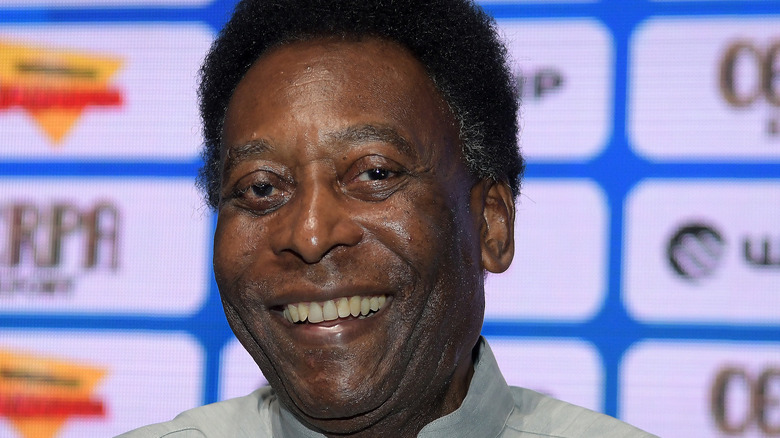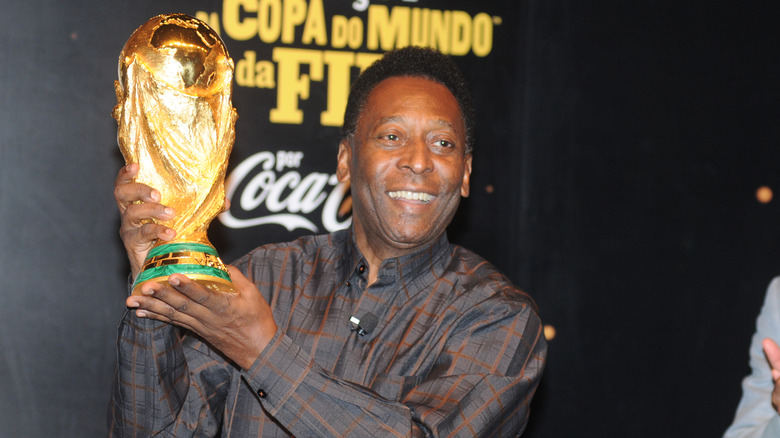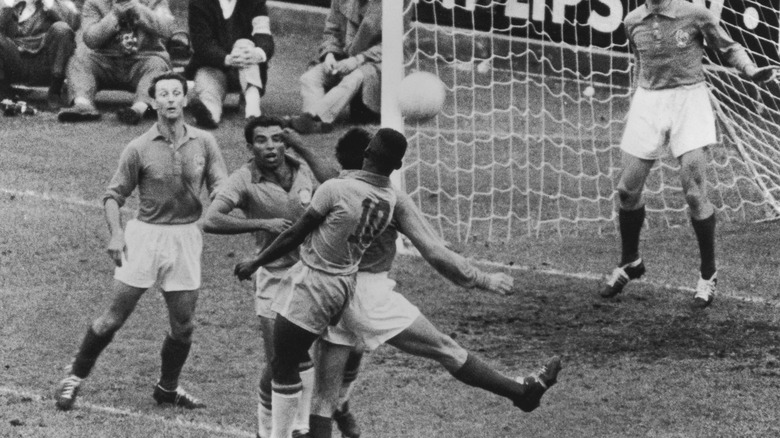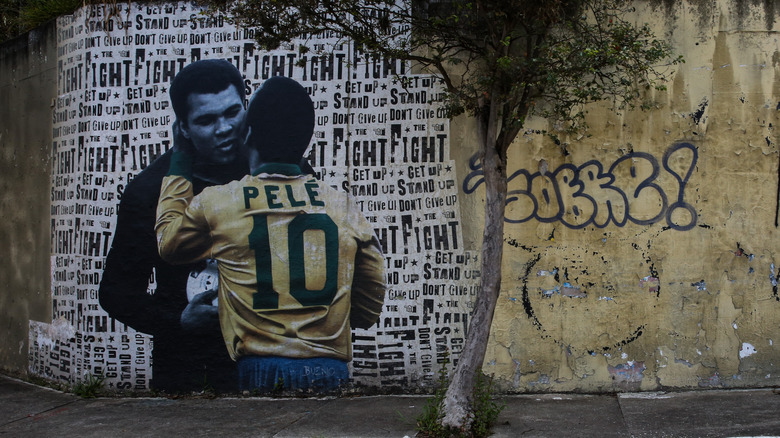The Heart-Wrenching Death Of Pelé
On December 28, 2022, the world said a heart-stricken goodbye to humanitarian, ambassador to his sport, and the greatest soccer player of all time, Pelé (via People). He was 82. Pelé had been undergoing treatment for colon cancer dating back to last September. A tumor was removed from his large intestine at that time, but the famed athlete had been recently sent to palliative care after he stopped responding to treatment. He received comfort and pain relief in his final days.
Pelé's official Twitter account posted, "A inspiração e o amor marcaram a jornada de Rei Pelé, que faleceu no dia de hoje. Amor, amor e amor, para sempre. Inspiration and love marked the journey of King Pelé, who peacefully passed away today. Love, love and love, forever."
The greatest soccer player of all time
"I was born for soccer, just as Beethoven was born for music." Such a statement, coming from Edson Arantes do Nascimento, commonly known as Pelé, rings completely and utterly true. Widely regarded as the greatest soccer player of all time, Pelé was one of those rare players who was not only "the most complete footballer" ever, as fellow legends Bobby Moore and Franz Beckenbauer put it (per Nonstop Football), but who also elevated the entire sport of soccer to new heights of intentional renown and athletic expectations. In highlight clip after highlight clip on FIFA TV, Evolution Football, Sports 360, and more, Pelé demonstrates absolute control over the ball when dribbling, receiving, or shooting, strategic powers of observation and prediction over the field and opponents' actions, and virtuosic instincts. Playing like Pelé was, as player Michel Platini said, to "play like God."
Over the course of his career with the Santos (1956-1974) and New York Cosmos (1975-1977), as Goal tells us, Pelé scored 1,281 goals in 1,363 games — although final figures are higher adjusting for friendly games and imprecise stat measurement. In international competitions, when Pelé played not only in the position of forward but an ambassador for his sport, he scored 77 goals across 92 games. He won World Cups in 1958, 1962, and 1970, an absolute host of trophies within his native Brazil (21 total), two trophies with the Cosmos, and numerous lifetime achievement awards.
Born into poverty and gifted from a young age
Born in 1940 in Três Corações, Brazil, northeast of Sao Paolo, Pelé grew up in complete poverty. His father, João Ramos, was a soccer player himself but struggled to make a living. Ramos taught his son soccer from a young age, but their family was so poor, as Sportcasting tells us, that Pelé had to practice using rolled-up socks stuffed with newspapers or a grapefruit. Long before he was "Pérola Negra" ("Black Pearl") or "O Rei" ("The King") to the world, per Biography, he was "the shoeless one" to neighborhood children.
As for his signature nickname, according to The Guardian, Pelé explained that it started with the goalkeeper "Bilé" on his father's team, Vasco de Sao Lourenco. As a child, Pelé got the name mixed up and said "Pilé" instead of "Bilé." Because of his thick accent, however, it came out "Pelé." Classmates deployed it to mock him, but by the time he'd become the greatest soccer player in recorded history, he naturally said in 2006, "I don't mind it so much."
As a teenager, Pelé's innate talents started to emerge by the time he joined a youth soccer team run by Waldemar de Brito. At age 15, Pelé left home to try out professionally for the Santos. By age 16, he scored his first career goal, and by 17 led the Santos to their 1958 World Cup.
A lifelong humanitarian and philanthropist
Pelé didn't merely provide an athletic model for future soccer players on the field while raising the baseline of what could be expected from the sport, he was also a role model off the field. From the moment he retired in 1977, Pelé started giving back from all the goodwill and talent that had been given to him. He set his humanitarian and philanthropic eyes on a number of causes, particularly "world peace," "international children's rights," and "poverty alleviation," as the Pelé Foundation says, all of which makes sense given his impoverished childhood.
In 1994, he was appointed a UNESCO Goodwill Ambassador, and for his work, UNESCO later awarded him a "Children in Need" Award in 2012. As Look to the Stars says, he was a patron of ABC Trust "Action for Brazil's Children," the FC Harlem youth soccer organization, The Littlest Lamb child support group for orphaned children, and more. In 2018 he launched the Pelé Foundation, a "charitable endeavor that will benefit organizations around the world and their dedicated efforts to empower children, specifically around poverty and education." He also had an Honorary Doctorate Degree from the University of Edinburgh.
Pelé was married three times and divorced twice, in addition to numerous admitted affairs. He married his third wife in 2016, per The 18, and had seven children altogether. Per the Mirror, he never publicly acknowledged any of his children born outside of his marraiges.



